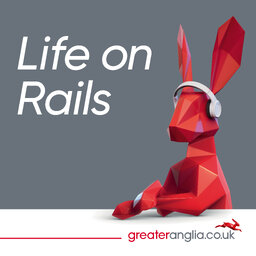How To Test Trains, Travel For Less and Write Poetry
Juliette Maxam and Lucy Wright return to delve behind the scenes of Greater Anglia.
East Anglian poet Luke Wright talks about how his love of East Anglia inspires his work in the latest episode of Greater Anglia’s Life On Rails podcast. Listen to find out what Luke is writing next, and hear him read a poem about his dad’s daily commute to London.
This episode also reveals the extensive testing new trains are subjected to before being declared fit for passengers; the weird and wonderful excuses proffered by fare dodgers, and how the railway prepares for March winds and April showers.
Finally, podcast regular fares guru Ken Strong explains how to travel between London and Norwich for just £6.60.
We’d love to hear from you, please tweet us at @GreateAngliaPr #LifeOnRails. Be sure to subscribe to the podcast as well, and visit www.greateranglia.co.uk/podcast to discover more.
 Life On Rails
Life On Rails


